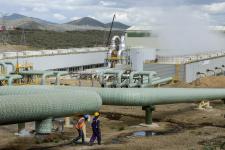If we are to build partnerships around energy Denmark must be willing to address African priorities

We cannot expect African countries to choose Denmark and the West over Russia and China, but we can offer them better terms based on respect and equality. That was the joint message of the Danish Minister for Foreign Affairs, Lars Løkke Rasmussen, and the Minister for Development Cooperation and Global Climate Policy, Dan Jørgensen, in the daily Politiken recently. They wrote the piece as a new Danish strategic approach for engaging with the African continent was about to be launched (Lars Løkke og Dan Jørgensen: Afgangsskærmen i Addis Ababas lufthavn bør bekymre Vesten. Det bekymrer os - politiken.dk). However, if we want to offer them better terms in the energy sector, we will have to make an extra effort. Over a decade, China became the single biggest financial contributor to energy projects in Africa. That also matters for the prospects of Denmark strengthening its ties with the continent. Energy is hugely important. Many still lack access to modern energy, and to change this is a political priority among decision-makers and populations. In addition, supplies are often unreliable due to outdated power infrastructure. This hampers economic growth, another political priority.
If we wish to use energy to help build partnerships, we must help address such shortcomings. If Denmark chooses to focus too narrowly on the energy transition, we will struggle. We have to be willing to listen to our potential partners’ priorities, including when they go beyond renewable energy projects. Such projects can help improve energy access and energy security, but solutions have to be adapted to country contexts. A country like Kenya has managed to expand its power supplies by means of its geothermal resources, as well as solar and wind. In countries with oil and gas resources, however, the dynamics will be different. There, renewable energy may not always be the cheapest form of energy, and it may be difficult to integrate into existing power grids. The prospects of export revenues also provide particular incentives for the continued production of fossil fuels. If we are to offer better terms, we really must make an effort. Good intentions are not enough.
China got the point. Its government has generally been willing to accommodate African priorities in the energy sector. It has generally been open to supporting energy projects irrespective of what the energy source is, though it has stopped supporting coal-power projects recently. If we wish to strengthen partnerships through energy, we will also have to listen carefully. In oil- and gas-producing countries we must be willing to discuss fossil-fuel resources as well. In the process we may be able to convince our partners that renewable energy generates better and cheaper energy supplies or that their fossil fuels can be put to better use while increasing the share of renewables in their energy mix. But we have to be willing to work across technologies.
Currently, there is much excitement about the potential for African countries to benefit from the increased global demand for the critical minerals needed for the green transition. A mining country like Zambia is already working strategically to get more out of its critical minerals. Some also suggest that African countries may be able to obtain a bigger share when it comes to the production of renewable energy technologies. However, for the energy transition to contribute to economic growth and job creation, a green industrial policy is required. This may be one of the most promising avenues through which to build partnerships. At the moment, African countries tend to produce raw materials for export and processing abroad, primarily in China, but also in the EU and USA. Green industrial policy should no longer be a taboo, including given that we in the West have embarked on it on a massive scale. The EU and USA have in fact signalled that they have become more accommodating towards ‘friendshoring’, that is, moving production from China to countries with which they are politically more aligned. The USA’s Build Back Better World initiative and the EU’s Global Gateway can potentially help contribute with financing for such projects and thereby building partnerships. Indeed, they have already agreed with some African countries about investigating how this can be done.
This does not mean that we should ignore the challenges. The international competition for investments is tough, and African countries are often perceived to be politically and economically unstable investment destinations. Realism is important. Historically, the continent is rife with failed industry projects. However, instability is not an African prerogative. Initiatives like the US Inflation Reduction Act (IRA) with its massive subsidies for domestically produced technologies and the EU’s Carbon Border Adjustment Mechanism (CBAM) with tariffs on energy-intensive materials produced outside the Union have caused consternation in some capitals. The initiatives were taken without much prior dialogue with the African continent. There is a risk that they may undermine Africa’s prospects of capturing a greater share of global value chains.
When partnerships are about industrial and trade policies, a small country like Denmark will struggle to make a difference. In such matters it is the big blocks that make the rules we have to follow. However, we are a member of the EU and may seek to make our voice heard more strategically in the Union. One message could be that we in Europe should be very careful not to undermine the potential for building partnerships through unilateral initiatives like CBAM. We should rather seek to intensify our dialogue and cooperation. With our wind industry and experience of being an ambitious early mover in the energy transition, we may have some influence in such discussions. Overall, we have to collaborate more if we wish to accommodate the priorities of African countries and build partnerships. It would be wise for a new Danish strategic approach to engaging with Africa to reflect that.
DIIS Eksperter
